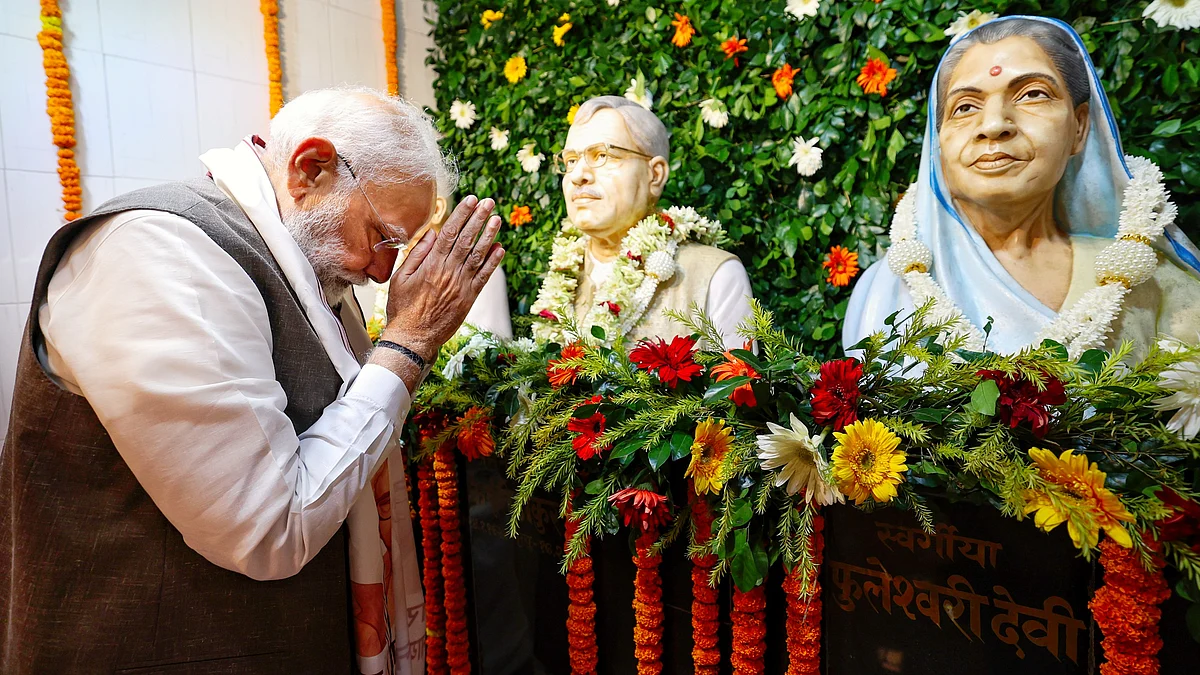‘Did RSS-Jana Sangh not topple Karpoori Thakur govt?’ Congress asks Modi
Known as 'Jananayak', Thakur was a socialist icon who rose from a humble nai (barber) family to become Bihar’s 11th chief minister

As Prime Minister Narendra Modi launched the NDA’s Bihar election campaign from the native village of Bharat Ratna Karpoori Thakur, the Congress on Thursday reminded him of a chapter from history, accusing the RSS and its then political arm, the Bharatiya Jana Sangh, of betraying Thakur and toppling his government in 1979.
“Modi ji should remember that it was the RSS and the Jana Sangh — the ideological ancestors of today’s BJP — who pulled down Karpoori Thakur’s government because he had implemented a new reservation policy for the backward classes,” Congress MP and general-secretary (communications) Jairam Ramesh said in a video the Congress posted on X.
Known as 'jananayak' (people’s hero), Thakur was a socialist leader who rose from a humble nai (barber) family to become Bihar’s 11th chief minister on 24 June 1977.
His political life was marked by simplicity and an unflinching commitment to social justice. Thakur’s landmark 'Karpoori Thakur Formula', introduced in 1978, provided 26 per cent reservation for Other Backward Classes (OBCs) based on the 1970 Mungeri Lal Commission report — 12 per cent for the “most backward”, 14 per cent for backward castes, 3 per cent for women, and 3 per cent for economically weaker sections among the upper castes.
The move triggered sharp backlash from upper-caste groups, helped along by the Jana Sangh faction in Thakur’s coalition Janata government. Jana Sangh MLAs and RSS cadres even reportedly walked the streets, verbally abusing Thakur and chanting slogans like “yeh reservation kahan se aai, Karpoori ke mai biyayi (where did this reservation come from? Karpoori’s mother gave birth to it)', intended as caste-based mockery.
Such mobilisation by the Sangh parivar (RSS/Jana Sangh) helped upper‐caste/anti‐reservation sentiment build in Bihar, creating social and political pressure on Thakur’s government, and finally leading to his resignation on 21 April 1979.
Despite mentoring future leaders like Lalu Prasad Yadav, Nitish Kumar, and Ram Vilas Paswan, Thakur himself lived and died without wealth or office, revered for his integrity and humility.
In 2024, on his birth centenary, the Modi government posthumously awarded him the Bharat Ratna — a move widely seen as an attempt to claim his legacy among Bihar’s large OBC population.
Ramesh also questioned Modi’s silence on the caste census and the BJP’s commitment to social justice. “When the Mahagathbandhan government in Bihar conducted a caste survey and passed an Act granting 65 per cent reservation to Dalits, Adivasis, OBCs, and EBCs, why did the so-called ‘double engine’ government not give constitutional protection to that law by including it in the Ninth Schedule?” he asked.
Analysts say the competing claims over Thakur’s legacy underline how crucial the OBC vote is in Bihar’s politics. According to the caste-based survey released by the Bihar government on 2 October 2023, OBCs constitute 63.13 per cent of the state’s population of over 13 crore — making them the decisive electoral bloc in the upcoming polls.
The Bihar Assembly elections will be held in two phases. Phase I, scheduled for 6 November, will cover 121 Assembly segments across northern and western districts such as West Champaran, East Champaran, Sitamarhi, Madhubani and adjoining regions. Phase II, on 11 November, will cover the remaining 122 segments, including key urban and eastern districts like Patna, Gaya, and Bhagalpur.
Follow us on: Facebook, Twitter, Google News, Instagram
Join our official telegram channel (@nationalherald) and stay updated with the latest headlines
